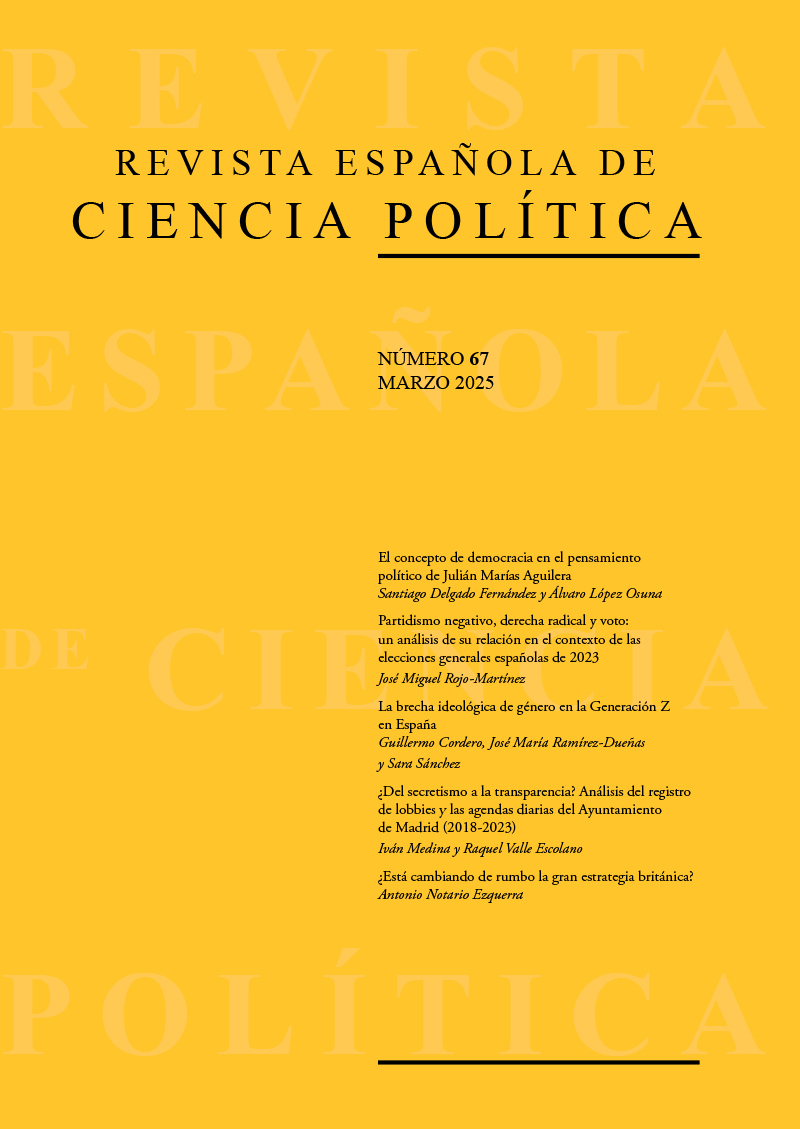La brecha ideológica de género en la Generación Z en España
DOI:
https://doi.org/10.21308/recp.67.03Palabras clave:
España, Generación Z, brecha de género, ideología, jóvenes, conservadurismoResumen
En los últimos años se ha observado la aparición de una brecha ideológica entre los jóvenes y las jóvenes en España. Con el objetivo de entender este fenómeno, analizamos su origen, estudiando la evolución que desde los años ochenta se ha producido en dos de los componentes que tradicionalmente han explicado la autoubicación ideológica: las actitudes y el voto. Los resultados muestran que las diferencias entre hombres y mujeres son más pronunciadas en la Generación Z (entre 18 y 25 años) que en los demás grupos etarios, debido fundamentalmente a un cambio de tendencia en los hombres. Los jóvenes de la Generación Z se sitúan y optan por partidos más cercanos a la derecha, mostrando actitudes cada vez más conservadoras y menos favorables a la igualdad que las mujeres de su misma generación. Además, son los que muestran las cotas más bajas de apoyo a la democracia, alcanzando niveles desconocidos desde los años setenta. Estudiar el origen de esta nueva brecha ideológica resulta imprescindible como primer paso para entender sus potenciales consecuencias políticas.
Descargas
Citas
Abou-Chadi, Tarik, Magdalena Breyer y Theresa Gessler. 2021. «The (re) politicisation of gender in Western Europe». European Journal of Politics and Gender, 4(2), pp. 311-314. https://doi.org/10.1332/251510821X16177312096679
Adamczyk, Amy y Liao, Yen-Chiao. 2019. «Examining public opinion about LGBTQ-related issues in the United States and across multiple nations». Annual Review of Sociology, 45, pp. 401-423. https://doi.org/10.1146/annurev-soc-073018-022332
Almond, Gabriel y Sidney Verba. 1963. The Civic Culture; Political Attitudes and Democracy in Five Nations. Nueva Jersey: Princeton University Press.
Alonso, Alba y Julia Espinosa-Fajardo. 2021. «Blitzkrieg against democracy: Gender equality and the rise of the populist radical right in Spain». International Studies in Gender, State & Society, 28(3): 656-681. https://doi.org/10.1093/sp/jxab026
Alwin, Duane y Ryan J. McCammon. 2003. Generations, cohorts, and social change. Boston: Springer.
Anduiza, Eva y Guillem Rico. 2024. «Sexism and the far-right vote: The individual dynamics of gender backlash». American Journal of Political Science, 68(2): 478-493. https://doi.org/10.1111/ajps.12759
Banet-Weiser, Sarah y Katryne C. Higgins. 2023. Believability: Sexual violence, media, and the politics of doubt. Cambridge: Polity Press. https://doi.org/10.1177/ 14647001241228856
Belchior, Ana María y Teixeira, Conceição Pequito 2023. «Breaking with mainstream politics while engaging with polarized: determinants of young Europeans’ support for democracy». Journal of Youth Studies, 27(7): 986-1005. https://doi.org/10.1080/13676261.2023.2187693
Besen, Yasemin y Gilbert Zicklin. 2007. «Young men, religion and attitudes towards homosexuality». Journal of Men, Masculinities and Spirituality, 1(3): 250-266.
Buser, Thomas, Louis Putterman y Joel Van Der Weele. 2016. «Gender and redistribution: Experimental evidence». Tinbergen Institute Discussion Paper no. 2016-063/I. https://hdl.handle.net/11245.1/03d811e4-b0e7-4d92-9aaa-a9a4ef5e6614
Cabezas, Marta. 2022. «Silencing feminism? Gender and the rise of the nationalist far right in Spain». Signs: Journal of Women in Culture and Society, 47(2): 319-345. https://doi.org/10.1086/716858
Calvo, Kerman y Irene Martín. 2009. «Ungrateful Citizens? Women’s Rights Policies in Zapatero’s Spain». South European Society and Politics, 14(4): 487-502. https://doi.org/10.1080/13608740903503860
Carian, Emily, K. 2022. «The Inversive Sexism Scale: Endorsement of the Belief that Women are Privileged» en Emily K. Carian, Alex DiBranco, Chelsea Ebin (eds.), Male supremacism in the United States: from patriarchal traditionalism to misogynist incels and the alt-right. London: Routledge. https://www.taylorfrancis.com/books/9781003164722.
Cerezo, Pepe. 2016. «La Generación Z y la Información». Revista de Estudios de Juventud, 114: 95-109.
Cobo, Rosa. 2011. Hacia una nueva política sexual: las mujeres ante la reacción patriarcal. Madrid: Los Libros de la Catarata.
Conover, Pamela. 1988. «Feminists and the gender gap». The Journal of Politics, 50(4): 985-1010. https://doi.org/10.2307/2131388
Cordero, Guillermo e Irene Martín. 2011. «Quiénes son y cómo votan los españoles de izquierdas». Madrid: Los libros de la Catarata.
Cordero, Guillermo y Juan Roch. 2023. «Democracia se escribe con Z. Jóvenes, precariedad laboral y actitudes políticas». Documentos de Trabajo nº 223. Fundación Alternativas.
De Leeuw, Sjifra E., Roderik Rekker, Rachid Azrout y Joost H. P. van Spanje. 2021. «Are would-be authoritarians right? Democratic support and citizens’ left-right self-placement in former left-and right-authoritarian countries». Democratization, 28(2): 414-433. https://doi.org/10.1080/13510347.2020.1827230
De Vaus, David y Ian McAllister. 1989. «The changing politics of women: gender and political alignment in 11 nations». European journal of political research, 17(3): 241-262. https://doi.org/10.1111/j.1475-6765.1989.tb00193.x
Dietze, Gabriele, y Julia Roth.2020. Right-wing populism and gender: European perspectives and beyond. Gender studies (Bielefeld, Germany). Bielefeld: Transcript.
Dinas, Elias. 2014. «Does choice bring loyalty? Electoral participation and the development of party identification». American Journal of Political Science, 58(2): 449-465. https://doi.org/10.1111/ajps.12044
Duffy, Bobby,Campbell Rosie y Gideon Skinner. 2024. «Emerging tensions? How younger generations are dividing on masculinity and gender equality». King’s global institute for women’s leadership. https://www.kcl.ac.uk/policy-institute/assets/emerging-tensions.pdf
Duverger, Maurice. 1955. The Political Role of Women. Paris: UNESCO.
Easton, David. 1975. «A Re- assessment of the Concept of Political Support». Journal of Political Science, 5: 435-457. http://www.jstor.org/stable/193437.
Fernández-Guzmán, Eva, Martín Portos y Andrea Felicetti. 2023. «Young People’s Attitudes towards Democracy and Political Participation: Evidence from a Cross-European Study». Government and Opposition, 59(2): 582-604. doi:10.1017/gov.2023.16
García-Albacete, Gema y Javier Lorente. 2019. «La juventud después de la austeridad. Comportamiento y actitudes políticas». Revista Internacional De Sociología, 77(4), e141. https://doi.org/10.3989/ris.2019.77.4.19.004
Giger, Nathalie. 2009. «Towards a modern gender gap in Europe?: A comparative analysis of voting behavior in 12 countries». The Social Science Journal, 46(3): 474-492. https://doi.org/10.1016/j.soscij.2009.03.002
Gillion, Daniel, Jonathan Ladd y Marc Meredith. 2020. «Party polarization, ideological sorting and the emergence of the US partisan gender gap». British Journal of Political Science, 50(4):1217-1243. doi:10.1017/S0007123418000285
Givens, Terri E. 2004. «The radical right gender gap», Comparative Political Studies, 37(1):30-54. https://doi.org/10.1177/0010414003260124
Harteveld, Eelco, Wouter Van Der Brug, Stefan Dahlberg, y Andrej Kokkonen. 2015. «The Gender Gap in Populist Radical-Right Voting: Examining the Demand Side in Western and Eastern Europe», Patterns of Prejudice, 49(1-2):103-134. https://doi.org/10.1080/0031322X.2015.1024399
Hernández, Enrique y Hanspeter Kriesi. 2016. «The electoral consequences of the financial and economic crisis in Europe». European Journal of Political Research, 55(2):203-224. https://doi.org/10.1111/1475-6765.12122
Inglehart, Ronald. 1977. The Silent Revolution: Changing Values and Political Styles Among Western Publics. Princeton University Press.
Inglehart, Ronald. 1997. Modernization and Postmodernization: Cultural, Economic, and Political Change in 43 Societies. Princeton University Press.
Inglehart, Ronald y Hans Dieter Klingemann. 1976. «Party Identification, Ideological Preference and the Left-Right Dimension among Western Mass Publics» en I. Budge, I. Crewe and D. Farlie (eds.), Party Identification and Beyond. Representations of Voting and Party Competition. London: Wiley.
Inglehart, Ronald y Pippa Norris. 2000. «The developmental theory of the gender gap: Women’s and men’s voting behaviour in global perspective». International Political Science Review, 21 (4):441-463. https://www.jstor.org/stable/1601598
Inglehart, Ronald y Pippa Norris. 2003. Rising tide. Gender equality and cultural change. Cambridge University Press.
Immerzeel, Tim, Hilde Coffé y Tanja Van der Lippe. 2015. «Explaining the gender gap in radical right voting: A cross-national investigation in 12 Western European countries». Comparative European Politics, 13: 263-286. https://doi.org/10.1057/cep.2013.20
Jelen, Ted. 2015. «Gender role beliefs and attitudes toward abortion: A cross-national exploration». Journal of Research in Gender Studies, 5(1): 11-22.
Jurado, Ignacio y Rosa M. Navarrete. 2021. «Economic crisis and attitudes towards democracy: How ideology moderates reactions to economic downturns». Frontiers in Political Science, 3, 685199. https://doi.org/10.3389/fpos.2021.685199
Kriesi, Hanspeter, Grande, Edgar, Lachat, Romain, Dolezal, Martin, Bornschier, Simon, Frey, Timotheos. 2008. West European politics in the age of globalization. Cambridge University Press.
Kehrberg, Jason. 2007. «Public opinion on immigration in Western Europe: Economics, tolerance, and exposure». Comparative European Politics, 5: 264-281. https://doi.org/10.1057/palgrave.cep.6110099
Knutsen, Oddbjørn. 1997. «The Partisan and the Value-Based Component of Left-Right Self-Placement: A Comparative Study». International Political Science Review, 18 (2): 191-225. https://doi.org/10.1177/019251297018002005
Lipset, Seymour. 1960. Political Man: the Social Bases of Politics. Nueva York: Doubleday.
Lipset, Seymour y Stein Rokkan. 1967. Party Systems and Voter Alignments. Nueva York: Free Press.
Lombardo, Emanuela, Johanna Kantola y Ruth Rubio-Marin. 2021. «De-Democratization and Opposition to Gender Equality Politics in Europe». Social Politics: International Studies in Gender, State & Society, 28 (3): 521-531. https://doi.org/10.1093/sp/jxab030
Mannheim, Karl. 1993 [1928]. «El problema de las generaciones». Revista Española de Investigaciones Sociológicas, 62: 193-242.
Martínez Tez, Carmen. 1990. «La participación política de la mujer en España»en Judith Astellarra, Participación política de las mujeres. Centro de Investigaciones Sociológicas.
Meaney, Glenn y B. J. Rye. 2010. «Gendered egos: Attitude functions and gender as predictors of homonegativity». Journal of Homosexuality, 57(10):1274-1302. https://doi.org/10.1080/00918369.2010.517074
Moreno, Cristina y Susana Ruiz-Seisdedos. 2023. «El género y el voto» en Pablo Oñate, José Manuel Rivera, Carmen Ortega, Las elecciones generales de noviembre de 2019. Centro de Investigaciones Sociológicas.
Mudde, Cas. 2007. Populist Radical Right Parties in Europe. Cambridge: Cambridge University Press.
Norrander, Barbara y Clyde Wilcox. 2008. «The gender gap in ideology». Political Behaviour, 30:503-523. https://doi.org/10.1007/s11109-008-9061-1
Norris, Pippa y Ronald Inglehart. 2019. Cultural backlash: Trump, Brexit, and authoritarian populism. Cambridge: Cambridge University Press.
Off, Gefjon, Nicholas Charron, y Amy Alexander. 2022. «Who Perceives Women’s Rights as Threatening to Men and Boys? Explaining Modern Sexism among Young Men in Europe»Frontiers in Political Science, 4: 90981. https://doi.org/10.3389/fpos.2022.909811
Ormiere, Lucas. 2024. Base de datos longitudinal de las encuestas post-electorales del CIS para elecciones generales, europeas y referéndums (1976-2024).
Pease, Bob. 2020. «The rise of angry white men: Resisting populist masculinity and the backlash against gender equality» en Carolyn Noble y Goetz Ottmann (eds.), The challenge of right-wing nationalist populism for social work. Reino Unido: Routledge.
Pintor, Rafael. 1981. «El estado de la opinión pública española y la transición a la democracia». Revista Española de Investigaciones sociológicas, (13)7: 7-47. doi:10.2307/40182833
Ramírez-Dueñas, José María. 2016. «La influencia del género sobre el comportamiento político de las mujeres españolas (2000-2011)». RIPS: Revista de Investigaciones Políticas y Sociológicas, 15(1), 39-58
Ramírez-Dueñas, José María, Guillermo Cordero, Carla Barrio y Victor González-Carrasco. 2025. «Generación Z y actitudes machistas: Estudio de los efectos de la edad, género e ideología en las opiniones y actitudes hacia la igualdad de género». Working Paper.
Ramírez-Dueñas, José María y Guillermo Cordero (2025). «¿Consolidación o retroceso? Explorando las actitudes sociales hacia la diversidad sexual en España (1980-2022)». Empiria (en prensa).
Ramis-Moyano, Rodrigo, Sara Pasadas-del-Amo y Joan Font. 2023. «Not only a territorial matter: The electoral surge of VOX and the anti-libertarian reaction». PloS one, 18(4): E0283852. https://doi.org/10.1371/journal.pone.0283852
Rama, José; Lisa Zanotti, Stuart J. Turnbull-Dugarte y Andrés Santana. 2021. VOX: The rise of the Spanish populist radical right. Londres: Routledge.
Rinken, Sebastian. 2021. «Las actitudes ante la inmigración y los inmigrantes en España: datos recientes y necesidades de conocimiento». Instituto de Estudios Sociales Avanzados. http://hdl.handle.net/10261/254260
Shapiro, Robert y Harpreet Mahajan. 1986. «Gender Differences in Policy Preferences: A Summary of Trends From the 1960s to the 1980s». The Public Opinion Quarterly, 50(1): 42-61. https://doi.org/10.1086/268958
Shorrocks, Rosalind y Maria Grasso. 2020. «The attitudinal gender gap across generations: Support for redistribution and government spending in contexts of high and low welfare provision». European Political Science Review, 12(3): 289-306. doi:10.1017/S1755773920000120
Simón, Pablo, Silvia Clavería, Gema García-Albacete, Alberto López Ortega, y Margarita Torre. 2020. Informe Juventud en España 2020. Disponible en web: https://www.injuve.es/sites/default/files/adjuntos/2021/03/informe_juventud_espana_2020.pdf
Steele, Liza G. 2015. «Income Inequality, Equal Opportunity, and Attitudes About Redistribution». Social Science Quarterly, 96: 444-464. https://doi.org/10.1111/ssqu.12145
Spierings, Niels y Andrej Zaslove. 2015. «Dividing the Populist Radical Right between ‘Liberal Nativism’ and Traditional Conceptions of Gender». Patterns of Prejudice, 49(1-2): 163-173. https://doi.org/10.1080/0031322X.2015.1024466
Spierings, Niels. 2020. «Why gender and sexuality are both trivial and pivotal in populist radical right politics» en Gabriele Dietze y Julia Roth (eds.) Right-Wing Populism and Gender. Bielefeld: Transcript Verlag. https://doi.org/10.1515/9783839449806-003
Togeby, Lise. 1994. «Political implications of increasing numbers of women in the labor force». Comparative Political Studies, 20(2): 211-240. https://doi.org/10.1177/0010414094027002003
Van Ditmars, Mathilde. 2023. «Political socialization, political gender gaps and the intergenerational transmission of left-right ideology». European Journal of Political Research, 62(1): 3-24. https://doi.org/10.1111/1475-6765.12517
Verge, Tània. 2020. «Gender policy», en Ignacio Lago y Diego Muro (eds.), The Oxford Handbook of Spanish Politics. Oxford: Oxford University Press.
YoungPop (2023). Encuesta producida para el proyecto: «Descomponiendo el Voto a Partidos de Derecha Radical entre los Jóvenes: Precariedad Laboral, Insatisfacción con la Democracia e Inmigración YoungPop».
Descargas
Publicado
Cómo citar
Número
Sección
Licencia
Derechos de autor 2025 Guillermo Cordero, Jose María Ramírez-Dueñas, Sara Sánchez

Esta obra está bajo una licencia internacional Creative Commons Atribución-NoComercial-SinDerivadas 4.0.






